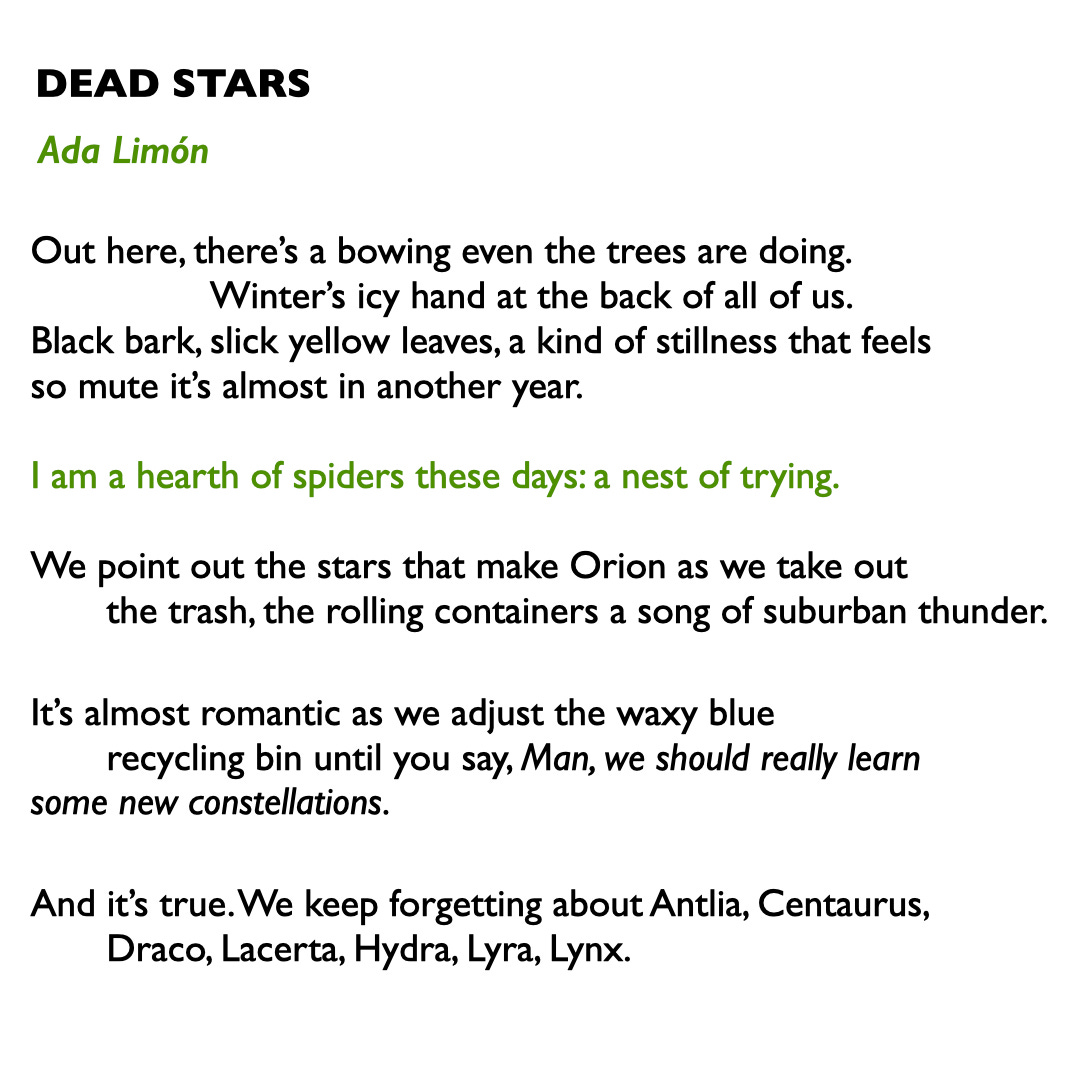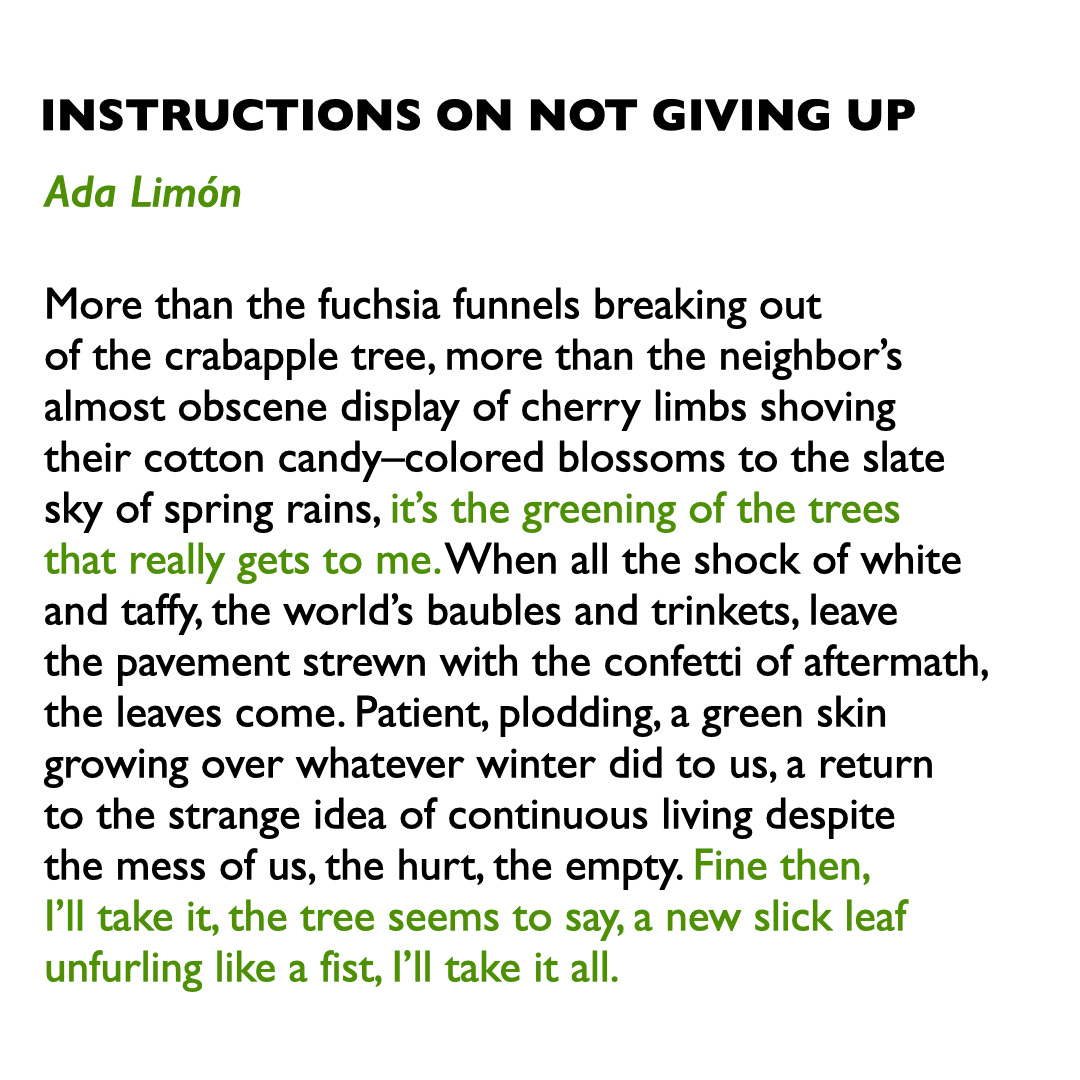“What would happen if we decided to survive more? To love harder?”
Ada Limón - 2 poems from 'The Carrying'
The streets are tired with the news of spring being interrupted with a live update on a hailstorm, or a winter resurgent with sharp falling things that aren’t snow. Grief is a bell behind sound-proof glass, and we wince, as we sense, only the silence of its ringing. Do you know this feeling? That the body is too small, to hold the raging forest, to turn breeze in its burning.
But even this fragility is shared. There will always be unkindness, and we will know it better, we will grasp its omnipresence, when the chorus of our broken fragments rise into an ever widening cathedral dome. What house can we build for a god, whose form is born, and dies, in palms that dare to cradle the sky?
I think of what it means to speak, how the world demands it, how the necessity of voice grows like fungus on walls littered with testimonies - I was here. What is work, then? What is truth, and what is report? In how many registers does the song of pain billow? What continents live in this anatomy of blistering faith? Who are these people, who name, who are silent, who are there simply because the air around them grows thick with their presence? The shape of our standing grows clearer, and sometimes, that is enough to define the landscape.
“What would happen if we decided to survive more? To love harder?”, asks Ada Limón, in a poem that scatters melancholy with the burgeoning breadth of its power, its simple awareness of reversal. What can a poem do, really?
A poem can stand, feet planted firmly in the sticky mud, defining only the circle of land it occupies. And as words grow in the page, into mind, as they evergreen into form, suddenly everything around becomes clearer. Have you known that moment? When you are listening so intently, when your attention is snatched by an unfamiliar sound - a lizard perhaps, or an ambulance siren; And in the silence after the anticipation of the sound, after the screech rises and dies down again, suddenly, the world alights.
And you can hear everything.
Every little whisper, even falling dust.
Limón’s magnificent collection surges in rivulets through the wet mud of grief, of gathering pain, and of anxieties whose comet trails we know but can never fully name, even to ourselves. But at the heart of it, there is a freeing, even in this endeavour to turn into poems that which is deeply personal, and that which is everywhere. It turns both melancholy, and its many unwieldy storeys, and joy, into that same chorus. And we know it at that moment of compassion, when it fans out, every time it is born in another reading. I quote from an interview where she talks of this unique bond, this panoramic unspooling of language into shared experience.
“I think poetry is a way of carrying grief, but it’s also a way of putting it somewhere so I don’t always have to heave it onto my back or in my body. The more I put grief in a poem, the more I am able to move freely through the world because I have named it, spoken it, and thrown it out into the sky. Everyone has grief that they carry and sometimes we have anxiety and depression about anticipatory grief. The thing that I’ve found that helps is knowing we are all in this, someone has gone or is going through the same thing. Poetry helps us with that too. Writing. Reading. As James Baldwin said, “You think your pain and heartbreak are unprecedented in the history of the world, and then you read.”
This is what a poem does.
Joan Didion famously retyped Hemingway’s passages, and she talked about how it taught her about writing, and the unravelling yarn of narrative. I have known this, while writing poems, while typing out poems again - here, too - and especially, while writing about poems. Sometimes I can feel the unveiling of insight as I retrace the footsteps of the meandering poet, of their story unfolding once again.
We write the world into existence, and then we rewrite it in our own image, when we read it. This is the way it goes.
I read, again, today, poems, from Ada Limón’s ‘The Carrying’ as if I was standing at the vanishing point of a wide-angled photograph. So much of the world filters into every new experience of a poem, a painting, or a song. How do we even know what ridges our pasts find, how the many corridored museums that are our turning selves, bluster through a single moment of transcendence, an innocent turn of phrase?
Spring is here. Cafes are bustling with people. Trees line the streets in an offering of red and yellow. Traffic is interminably alive again in its slowness. People are happy to be complaining about the jams again. Friends everywhere exchange glowing messages of renewal, pictures of latticed leaves netting borderless blues. Even as this celebration reminds us to be alive, I hold also, or try to, the grief of countless disappointments - even the distance of some.
I return to this theme again, and again - the simultaneity of a thousand shattering lives, and a thousand shattering lives. I never really know what to make of it. But as I write about it, I feel a lightening, because even giving it a name, that will change when it is repeated, feels like an activity complete in itself. I find a cleaving, in this constant activity of clearing a space. I learn also, from moments and utterances that reverse and rearticulate, that reframe the moment of looking at a thing that is larger than ourselves.
In Limón’s ‘Dead Stars’ for instance, what tremendous power there is - in that assertion of defiance. What a utopia of belonging that sensitivity signals, of being a constellation in the sky that shelters, and spreads.
If the poetry, and the commentary, resonate with you, do consider ‘buying me a coffee’. (Matlab, if you can’t, that’s also fine, obviously. This is a free newsletter)
Note: Those, not in India, who’d like to support the work I do at Poetly, do write to me - poetly@pm.me. (Paypal seems to have left the building, still figuring it out)
You can write to me, waise bhi, if you feel like it :)
Thanks for reading Poetly! Do subscribe if you are not reading this in your inbox. Cheers!






